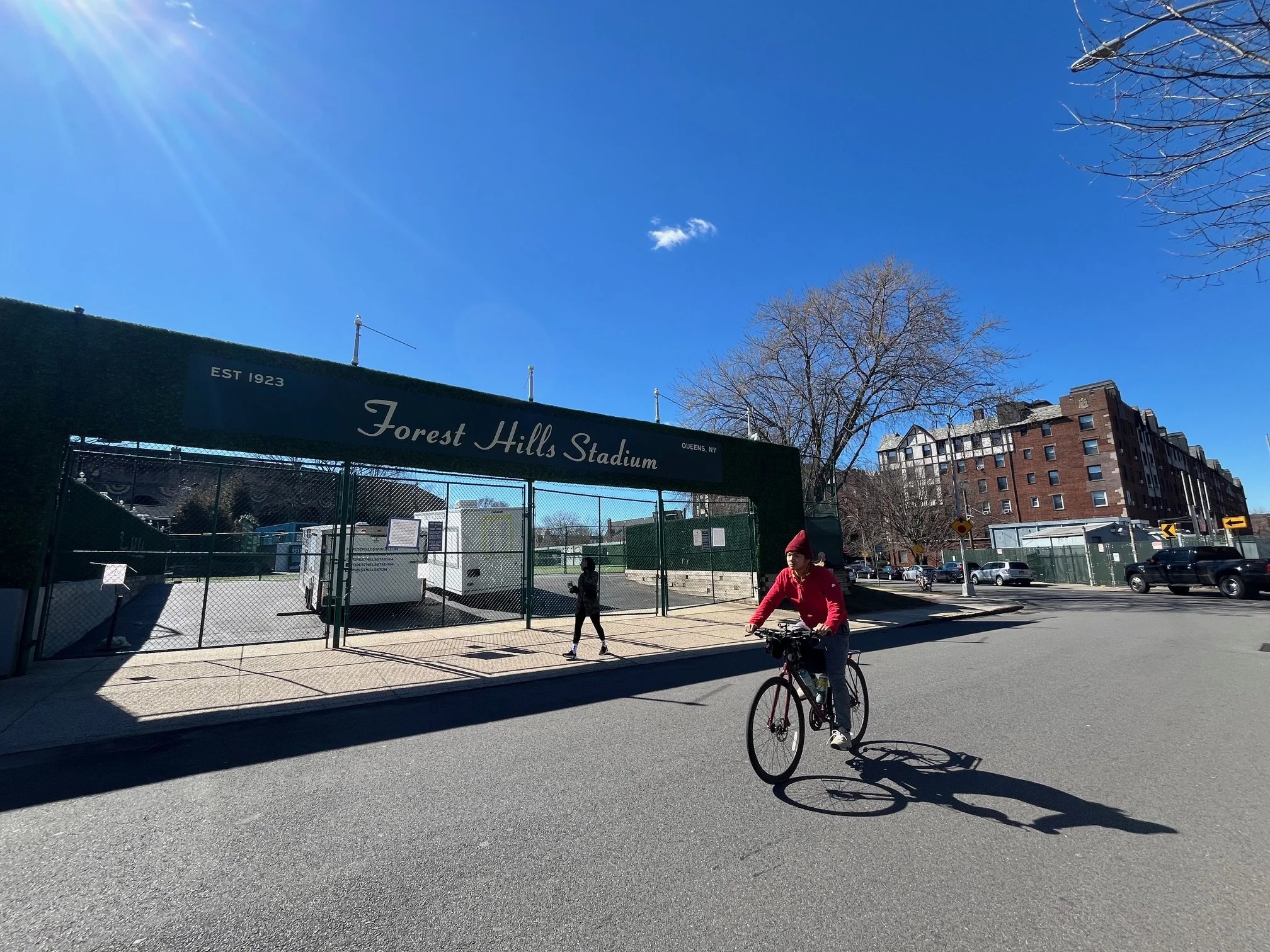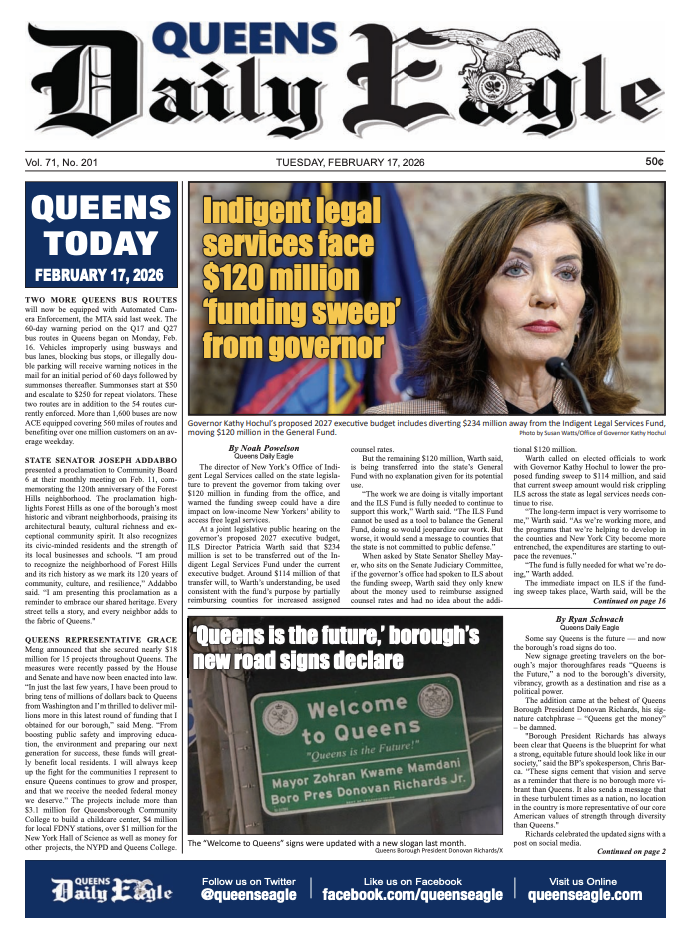Despite residents’ complaints, concerts at Forest Hills Stadium will go on, judge rules
/A Queens judge ruled on Monday that the Forest Hills Stadium concert season will go as scheduled, shooting down an injunction on its start as locals continue to seek relief against loud concerts. Eagle photo by Ryan Schwach
By Ryan Schwach
It is likely the concert season at Forest Hills Stadium will start on time this year, after a Queens judge ruled against a group of locals hoping to at least delay the start of concert season while the court considers their allegations that the venue has lowered quality of life in the residential neighborhood.
On Monday, Queens Supreme Court Justice Robert Caloras ruled against a request for a preliminary injunction brought by the plaintiffs in the lawsuit known as Concerned Citizens of Forest Hills v. the West Side Tennis Club, which would have suspended concerts at the venue until the case came to its conclusion.
For years, residents of the private neighborhood Forest Hills Gardens and those living in Forest Hills proper have claimed the stadium’s resurgence as a concert venue in recent years has brought with it large-scale quality of life issues relating to loud, allegedly window-shaking concerts and unruly crowds in the usually quiet suburban Central Queens community.
But in his decision, Caloras ruled that the defendants in the case – a group of residents – had failed to prove the noise from the stadium was “unreasonable.”
He also noted that there doesn’t seem to be consensus among residents of Forest Hills Gardens about the effects of the venue’s visiting artists, which this year include Neil Young, Pitbull, Pixies and Idles.
“The affidavits submitted by…plaintiffs conflict with the affidavits of residents submitted by defendant regarding the impact of the sound emanating from the stadium during events, with some complaining of disturbed sleep and high levels of noise, and others claiming no disturbances,” court documents obtained by the Eagle read. “It is not clear to the court how two neighbors could have such extraordinarily different experiences. Whether the homes of the residents defendant obtained affidavits from contain features that ‘ameliorate the effect of the sound’ is not for the court to surmise.”
Residents the Eagle had spoken to in recent months have had differing views on how much the stadium’s concert noise affects their daily life.
The court also said that affidavits from two independent sound experts retained by both parties who measured the noise from the stadium also reached different conclusions.
In its request for a preliminary injunction, the resident group said that if a full injunction wasn’t warranted, they would want to see the stadium craft a plan to mitigate certain sound issues. However, Caloras ruled that the appropriate parties were not named in the lawsuit, thus didn’t feel as though he was able to render any kind of order on sound mitigation.
“This court will not venture into asking artists to alter their live performances by adjusting their bass and the levels of various frequencies in their songs – especially when those artists are not parties to the case,” court documents read.
Tiebreaker, the company which operates the concerts, is also not a party to the lawsuit.
The judge also said that Tiebreaker has “extended great effort and expense” to try to mitigate the noise issues and work with city agencies.
In conclusion, the judge ordered the stadium to continue working with the Department of Environmental Protection and NYPD to stay within the law and noise regulations.
Akiva Shapiro, an attorney for Gibson Dunn & Crutcher who represents the stadium in the Concerned Citizens lawsuit, applauded the Monday ruling.
“Forest Hills Stadium is grateful for today's decision, in which the court found that the stadium has been working for years with all relevant city authorities and experts to address neighbor concerns,” Shapiro said in a statement to the Eagle.
“After decades of bringing entertainment and music to Queens, the stadium knows that a collaborative and open relationship with its neighbors is key,” Shapiro added. “Reasonability, cooperation, and engagement make the experience better for those attending the shows and everyone in the area. The stadium does not take its role as stewards of this 101-year-old icon lightly and deeply appreciates all the support and encouragement.”
In response to the Monday ruling, Concerned Citizens said in a statement that they don’t see the outcome of the ruling on the injunction as a total loss.
“We are reviewing the judge’s opinion and considering our options, however, we do note that, even though the court said that Concerned Citizen’s motion ‘is denied,’ it did in fact grant some of Concerned Citizen’s requested preliminary relief,” they said. “Our motion sought an order requiring that the Stadium comply with the Noise Code. The Court ordered this, stating that it ‘orders Defendants to continue working with the DEP and NYPD to comply with relevant rules and regulations including the Noise Code.’”
The group also said that despite Caloras’ ruling on the conflicting affidavits from noise experts, that they were “confident that after we have the opportunity to cross-examine defendant’s witness at trial, the court will agree with us that the noise levels from the concerts are indeed unreasonable and constitute a nuisance, thereby entitling us to a permanent injunction stopping the concerts.”
Regardless, the locals see this as just the beginning of a continuing court fight.
“This is just the beginning of what promises to be a long legal battle if city officials and the West Side Tennis Club fail to place reasonable restrictions on these events and if the DEP continues to fail to enforce the noise code,” they said. “In the end, the facts, the law, and basic common decency are on our side. No one should be able to break the law, cause their neighbor's homes to shake, and get away with it."
Concerned Citizens have argued that there has been a massive uptick in the amount of loud concerts at the stadium in recent years, which has violated noise regulations by both being too loud and happening too late in the night. Also, residents have said the large crowds leave trash and damage the insulated community when they descend on the neighborhood for shows.
Queens Supreme Court Justice Robert Caloras denied locals’ preliminary injunction against Forest Hills Stadium on Monday, allowing the concert season to go as planned. Eagle file photo
In return, lawyers for the stadium have argued the local group represents only a small section of the community, and that stopping concerts would be “catastrophic to the local economy, countless mom-and-pop businesses in the area, and the local job market.”
But the group is not alone – two other lawsuits have been brought related to the stadium in the past year.
Two of those cases are currently before Queens Supreme Court Justice Joseph Esposito.
The locals in the two other cases make similar arguments to the residents in the Concerned Citizens case.
Esposito recently heard oral arguments in a case brought by the Forest Hills Gardens Corporation, who’s residents have similar concerns, but also argue that the stadium’s concerts go against the legal zoning framework it operates under.
The Forest Hills Gardens Corporation also filed for a preliminary injunction calling for the stadium to pause its upcoming concert season while the case plays out. The parties made oral arguments in the case on Friday and Esposito is expected to issue a ruling in the case before the start of concert season, which comes during the first week in May.





